The influence of Tupac Shakur on pop culture and music is not measurable, and he is one of the strongest artists ever to have appeared on the scene. His rap career granted him a position in the Hip Hop Hall of Fame in 2002 and best MC in a 2003 vote by MTV viewers.
Rolling Stone also credited him with being among their 100 Greatest Artists of All Time. Tupac also made an undeniable impression in Tinseltown for unforgettable performances in such films as Juice (1992) and Poetic Justice, more evidence of versatility and scope extending beyond albums.
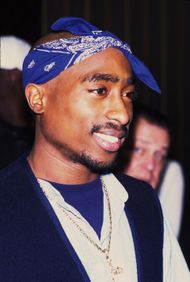
Born Lesane Parish Crooks, Tupac Amaru Shakur's one-year-old infancy name change was the start of a path down a road that would bring him to a life that would irreparably alter the music and culture of the world.
It was not only Tupac's skill with words in his raps that set him apart as one of the greatest of all time rappers, but also how he could see what was wrong with society and speak on those things so openly and truthfully.
His flow was distinctive, with rhythmic precision that caused his rhymes to sound new, and production acumen that allowed him to create some of the most timeless albums in Hip-hop.
Tupac didn't rhyme merely for rhyming; he used his rhymes to speak out against institutionalized injustices, his own demons, and a call to action, leaving behind a legacy that goes beyond music.
Tupac's artwork was defined by his ability to reconcile personal experience with larger issues of society, crafting lyrics that spoke to individuals and larger systemic issues.
Tracks like Changes, Keep Ya Head Up, Dear Mama, and Hit 'Em Up all reflect his special talent for writing about a series of themes, everything from empowerment and social inequality to personal strife and loyalty.
These, as with many other songs, represent Tupac's versatility and his capacity to convey deep emotions while questioning actual issues with unprecedented ferocity and honesty.
Here are the top 10 legendary Tupac Shakur songs that made history
Tupac Shakur's discography is an act of testament to his legacy, as his albums have defined hip-hop culture and etched its position in music history. His best songs are more than just hit singles; each has been a rebellious anthem, a resistance song, and an act of self-discovery.
Each is a different story, intermingling his own struggle, political consciousness, and unflinching observations about life. These ten classic songs not only introduced Tupac to the music world but cemented him as one of music's all-time greatest and most enduring legends.
Bitter, unapologetic diss songs sit alongside tortured, self-tormenting ballads in this collection of works, and they comprise the complete range of Tupac's abilities and remain profoundly moving to old and new fans alike.
Disclaimer: This article contains the writer's opinion. The reader's discretion is advised!
1) Brenda’s Got a Baby
Tupac's verse was classic straight away since they were inclined towards painting vivid descriptions of the ugliness that had been suffered through in America's inner city. In Brenda's Got a Baby, Tupac narrates the sad, pathetic story of a 12-year-old girl physically abused by her family and goes ahead to lead an existence of extreme misery and despondency.
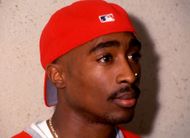
In a rich stanza, Tupac paints death scenes everywhere in her world, starkly and vividly placing at the intersection of social pathology and personal suffering that which consumed the bitter and premature life of her own.
The lyrics shout louder than narratives, they shock listeners with some hard truths, and leave nobody in any sort of uncertainty that few could even get anywhere close to Tupac's skill at blending narratives with social commentary so naturally.
Read More: Top 12 Metallica songs that defined heavy metal
2) How Do You Want It?
How Do You Want It marked a career-high point for Tupac, propelling him to mainstream stardom with its catchy, playful hooks and R&B-flavored smooth rap. The song came out in the summer of 1996 and was an instant hit, topping the charts at number one and remaining there for eight weeks running.
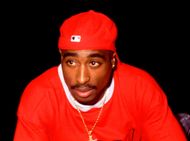
The song features an impeccable collaboration with R&B pair K-Ci and JoJo, whose soulful chorus complemented Tupac's aggressive verses to perfection. While the song most definitely is about physical intimacy, and its music video is as provocative as they come, Tupac still finds ways to include political references to political figures, which proves his expertise at bringing unrelated themes together, even in more of a commercial setting.
In so many ways, it was the anthem of the summer, being played in clubs and parties all over the country, something that reflected Tupac's ability to create music that spoke on more than one level.
Read More: 10 Jay-Z songs that changed the rap game
3) Hail Mary
Hail Mary and its influence and importance cannot be ignored. Included on his posthumous release The Don Killuminati: The 7 Day Theory, the song is sung by him as Makaveli, one of his aliases.
One of his most dauntingly intense tracks, the song was supposedly recorded in 30 minutes during the summer of 1996. The song showcases Tupac's skill at writing raw, potent lyrics in record time.
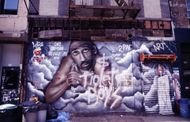
The brutality of the track is only heightened by not just Pac's rhymes, but by the Outlawz as well, who contributed their own rhymes to the pot. What sets Hail Mary aside is that the powerful blend of braggadocio, paranoia, and spiritualism is summarized to perfection within one of Tupac's best-known hooks.
The song conveys the complexity of Pac's personality, unwaveringly confident yet introspective, riddled with urgency and existential inquiry that makes it timeless, on the verge of being prophetic.
Read More: 10 Harry Styles songs every true fan knows by heart
4) So Many Tears
Tupac's songs were employed to turn more towards religious issues, but here in So Many Tears, he is wisely introspective, speaking as if to himself and the divine power as well, as if having an open-hearted dialogue.
In the album Me Against The World, released in 1995, the song presents us with a gloomy image of Tupac's mindset on one of the darkest days of his life.

As he grappled with piling pressures, legal troubles, and demons within, So Many Tears caught his vulnerability and uncertainty about things in an increasingly-tougher-appearing world. Less a recording of his own inner crisis than it is; it's a taking-account of areas of belief, unbelief, and being in a situation, so the song's more a stage-whispered confidence than anything resembling an act.
5) California Love
California Love is one of those hip-hop legends that not only epitomized an era but also epitomized the California spirit. California Love was the height of Dr. Dre's G-Funk period, during which clean, hook-laden beats were neatly complemented by West Coast swagger.
California Love came out as Dre's first single on Death Row Records and was an instant sensation, making Dre a legendary name in the world of rap.

For Tupac, signing with Death Row also involved working alongside Dre, a favorite artist whose music he had so much enthusiasm for. California Love proceeded to become cultural, transgressing generations and remaining an iconic symbol for California's sensual and vibrant vibe. The durability of its lifetime and its staying power as an example of being more than just a hit, the song is a cultural landmark.
Read More: Billie Eilish’s 10 most popular songs of all time
6) To Live & Die in L.A.
Among Tupac's greatest songs is an anthem that emerges as a true tribute to the adopted city of Los Angeles, reflecting his extensive affection for it and its troubles. Through the song, To Live & Die in L.A., Tupac intertwines street culture, social issues, and individual pride, covering a wide range from gang existence and police brutality, and love for marijuana.
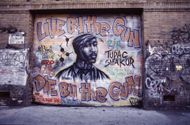
He never hesitates to speak truth to powerful people, even going so far as to call out California's governor, making his message political and personal. What takes this song truly to heart is Tupac speaking to a diverse group of people because he speaks both to his Black people and his brown people, yet also to the universal frustrations that many, race, could identify with.
They speak not only of his allegiance to L.A., but of his larger message of resistance and unity.
7) Dear Mama
Tupac's history with his mother, Afeni Shakur, is representative of his career, and it appears in his fondly sentimental salute to her, Dear Mama from the Me Against the World album. The song is not just one of his best, but a gesture of introspection and appreciation for a woman who endured so much, both in life and as a mother.
In Dear Mama, Tupac is honoring her strength and sacrifices, bringing him up alone through active addiction and struggles in life herself. The song is so powerful because there's something about vulnerability, outside the tradition of rap, Tupac walking the tightrope of raw truthfulness and discretion.
From a tender passage in Joe Sample's In All My Wildest Dreams, the song starts with regard and sorrow, the act of drawing out a softer but equally authentic Tupac.
For those new to Tupac's discography, Dear Mama serves as a good enough beginning point towards knowing and appreciating not only his music but also the raw emotional power behind his works.
8) Ambitionaz AZ A Ridah
Tupac's eternal All Eyez on Me comes swinging on the first song, presenting the album straight away, commanding everyone's attention and making the world pay attention to the fact that Pac was back home and wasn't leaving anytime soon.
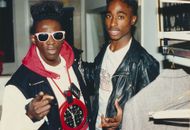
With the raw, in-your-face rhythms of Daz Dillinger and Michael Buffer's own classic "Let's get ready to rumble" chant backing it, Ambitionz Az a Ridah is a catchphrase anthem stating Tupac's purpose and dominance on the rap scene.
In addition to greeting the album into existence with the gravity it deserved, its steady popularity during a period spanning over two decades is a testament to its continued validity.
9) I Ain’t Mad at Cha
This song, I Ain’t Mad at Cha, assumes an introspective tone, where Tupac reveals a spirit of forgiveness and empathy toward others who used to misunderstand, judge, or estrange him from himself as his life took new turns with stardom.
Released soon after his premature death, the song has an otherworldly gravity, numerous listeners heard it as if Tupac was delivering a valediction from beyond, addressing both friends and detractors with a serene, near-prophetic specificity.
The music video, shot before his death, provides another affective layer, showing a fatal shooting and a dreamlike rise to heaven.
It's an eerie parallel to the real world that adds poignancy to the song's emotional resonance. What's most striking, though, is the maturity of thought behind the words. On a soulful groove and contemplative rhymes, the track demonstrates his skill at working through pain, progress, and redemption in a manner that still inspires listeners globally.
10) Changes
Changes is among Tupac's most powerful considerations of race, inequality, and the cycles of injustice that continue to afflict society. Instead of presenting a promise of hope, the song impacts with a harsh reality, celebrating a desire for improvement while also acknowledging the bitter truth that some things have not changed.
Tupac's rhymes draw on the frustration of a generation, blending observation of poverty, policing, and institutional oppression with a clarity that remains as pressing today as it was in the late '90s.
Its eerie relevance has only increased, reflected in contemporary movements and instances of turmoil, frequently reappearing during periods of protest as an unofficial anthem to continued strife. With its profoundly human voice and unvarnished realities, Changes is not only political, it's a mirror held up to a society that still struggles with the same issues Tupac exposed decades ago.
Tupac's music continues not just through lyrical excellence but also because his music spoke eternal truths about struggle and survival, identity and resistance. His tracks were able to convey the pure emotion of his generation in blending vulnerability with toughness, suffering, and purpose.
His words still sound today in conversations about justice, community, and seeking change, decades later.
Regardless of whether through music, activism, or reflection, Tupac made his voice a tool to address those so easily silenced, and thereby became something beyond a musician; he became a voice of truth that will never be silenced.
Keep reading SoapCentral for more informative content!
Also Read: 12 most popular BTS songs that took the world by storm
